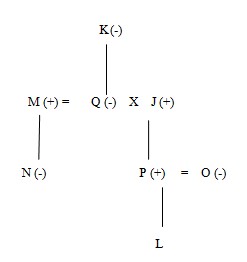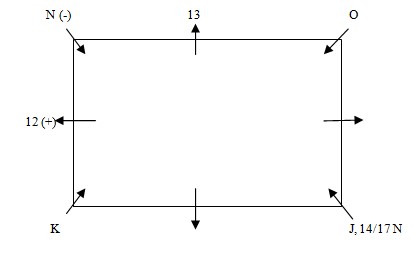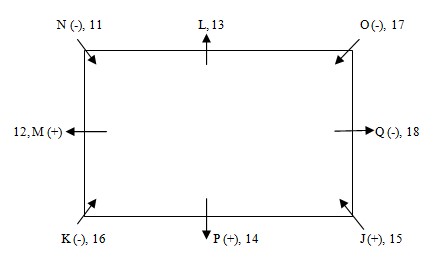Q’s brother M, sits on the immediate left of his mother who has 16 coins. J is the father of P and only one person sits between Q’s mother and N. O, who is sister of P, has 17 coins and is not an immediate neighbour of Q’s husband. P is father of L and is not an immediate neighbour of N. J is married to Q. By the statement ‘only one person sits between Q’s mother and N’, we find that K is Q’s mother and N is M’ daughter.  No female is an immediate neighbour of K, who sits at the corner of the table. K sits second to the left of Q’s husband who has neither 14 nor 17 coins. Only one person is sitting between J and O. M’s daughter sits second to the right of O and on the immediate left of that person who has 13 coins. N sits on the immediate right of the person who has 12 coins.
No female is an immediate neighbour of K, who sits at the corner of the table. K sits second to the left of Q’s husband who has neither 14 nor 17 coins. Only one person is sitting between J and O. M’s daughter sits second to the right of O and on the immediate left of that person who has 13 coins. N sits on the immediate right of the person who has 12 coins.  M, sits on the immediate left of his mother who has 16 coins. P is not an immediate neighbour of N. So, P can sit at immediate right or immediate left to J. If P sits immediate right to J, and as we know that Q is female so she sit at immediate left to N. We know that P sits second to the right of the person who has 18 coins. By this statement this condition is not possible. If P sits immediate left to J, so Q will sit at immediate right to J. Then L will sit at immediate left to N. Further P sits second to the right of the person who has 18 coins. It is given that N has 11 coin and that of O is 17. So P will have 14 and J will have 15 coins.
M, sits on the immediate left of his mother who has 16 coins. P is not an immediate neighbour of N. So, P can sit at immediate right or immediate left to J. If P sits immediate right to J, and as we know that Q is female so she sit at immediate left to N. We know that P sits second to the right of the person who has 18 coins. By this statement this condition is not possible. If P sits immediate left to J, so Q will sit at immediate right to J. Then L will sit at immediate left to N. Further P sits second to the right of the person who has 18 coins. It is given that N has 11 coin and that of O is 17. So P will have 14 and J will have 15 coins. 
A shopkeeper sold an article at marked price and got a profit of 50%. If he had given a discount of 20%, then find his new profit percent.
Shyam determined that his profit is 20% of the selling price. What is his actual profit percentage based on the cost price?
A person 'P' purchased an item and sold it to 'K' with a profit margin of 32%. If the item had been purchased for Rs. 1,500 less and sold for Rs. 500 mo...
A shopkeeper purchased an article for Rs. ‘a’ and marked it 140% above its cost price and sold it after giving two successive discounts of 480 and 2...
Anita tried her hands on selling a cake that she had baked. She sold half of her cake at 20% profit, but seeing that cake would perish soon, sold half o...
The cost price of 12 articles is equal to the selling price of 9 articles while the discount (D) on 8 articles is equal to the profit (P) on 6 articles....
A man sold two articles at Rs. 1200 each. On one, he gained 20% and on the other, he lost 25%. Find the overall percentage loss.
A merchant sells two items, 'X' and 'Y'. The cost price ratio of item 'X' to item 'Y' is '3:5'. The profit earned on selling item 'X' is 35%, while on i...
A man bought 18 glasses for Rs.12 and sold 12 glasses for Rs 18. What is the profit percent?
A shopkeeper purchases 5 packs of chips for Rs. 75. For how much should he sell one pack to get a profit of 25%?